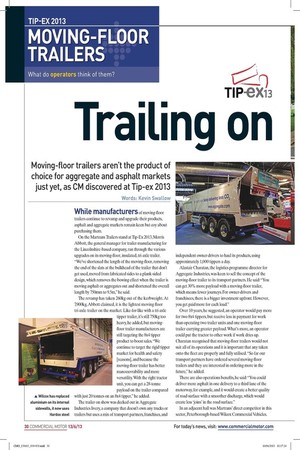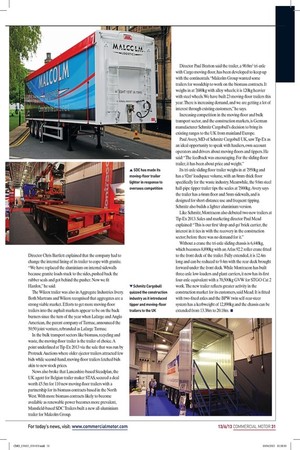Trailing on I Moving-floor trailers aren't the product of choice
Page 21

Page 22

If you've noticed an error in this article please click here to report it so we can fix it.
for aggregate and asphalt markets just yet, as CM discovered at Tip-ex 2013 Words: Kevin Swallow While manufacturers of moving floor trailers continue to revamp and upgrade their products, asphalt and aggregate markets remain keen but coy about purchasing them.
On the Martrans Trailers stand at Tip-Ex 2013, Morris Abbott, the general manager for trailer manufacturing for the Lincolnshire-based company, ran through the various upgrades on its moving-floor, insulated, tri-axle trailer. "We've shortened the length of the moving-floor, removing the end of the slats at the bulkhead of the trailer that don't get used, moved from fabricated sides to a plank-sided design, which removes the bowing effect when the trailer is moving asphalt or aggregates out and shortened the overall length by 750mm to 9.5m," he said.
The trailer on show was decked out in Aggregate Industries livery, a company that doesn't own any trucks or trailers but uses a mix of transport partners, franchises, and independent owner-drivers to haul its products, using approximately 1,000 tippers a day.
Alastair Charatan, the logistics programme director for Aggregate Industries, was keen to sell the concept of the moving-floor trailer to its transport partners. He said: "You can get 30% more payload with a moving-floor trailer, which means fewer journeys. For owner-drivers and franchisees, there is a bigger investment upfront. However, you get paid more for each load."
Over 10 years, he suggested, an operator would pay more for two 8x4 tippers, but receive less in payment for work than operating two trailer units and one moving-floor trailer carrying greater payload. What's more, an operator could put the tractor to other work if work dries up. Charatan recognised that moving-floor trailers would not suit all of its operations and it is important that any taken onto the fleet are properly and fully utilised. "So far our transport partners have ordered several moving-floor trailers and they are interested in ordering more in the future," he added.
There are also operations benefits, he said: "You could deliver more asphalt in one delivery to a third lane of the motorway, for example, and it would create a better quality of road surface with a smoother discharge, which would create less 'joins' in the road surface."
In an adjacent hall was Martrans' direct competitor in this sector, Peterborough-based Wilcox Commercial Vehicles. Director Chris Bartlett explained that the company had to change the internal lining of its trailer to cope with granite. "We have replaced the aluminium on internal sidewalls because granite loads stuck to the sides, pushed back the rubber seals and got behind the pusher. Now we fit Hardox," he said.
The Wilcox trailer was also in Aggregate Industries livery. Both Martrans and Wilcox recognised that aggregates are a strong viable market. Efforts to get more moving-floor trailers into the asphalt markets appear to be on the back burners since the turn of the year when Lafarge and Anglo American, the parent company of Tarmac, announced the 50:50 joint venture, rebranded as Lafarge Tarmac.
In the bulk transport sectors like biomass, recycling and waste, the moving-floor trailer is the trailer of choice. A point underlined at Tip-Ex 2013 via the sale that was run by Protruck Auctions where older ejector trailers attracted few bids while second-hand, moving-floor trailers fetched bids akin to new stock prices.
News also broke that Lancashire-based Steadplan, the UK agent for Belgian trailer maker STAS, secured a deal worth £5.5m for 110 new moving-floor trailers with a partnership for its biomass contracts based in the North West. With more biomass contracts likely to become available as renewable power becomes more prevalent, Mansfield-based SDC Trailers built a new all-aluminium trailer for Malcolm Group. Director Paul Bratton said the trailer, a 90.8m3 tri-axle with Cargo moving-floor, has been developed to keep up with the continentals. "Malcolm Group wanted some trailers for woodchip to work on the biomass contracts. It weighs in at 7,680kg with alloy wheels; it is 120kg heavier with steel wheels. We have built 23 moving-floor trailers this year. There is increasing demand, and we are getting a lot of interest through existing customers," he says.
Increasing competition in the moving-floor and bulk transport sector, and the construction markets, is German manufacturer Schmitz Cargobulfs decision to bring its existing ranges to the UK from mainland Europe.
Paul Avery, MID of Schmitz Cargobull UK, saw Tip-Ex as an ideal opportunity to speak with hauliers, own-account operators and drivers about moving-floors and tippers. He said: "The feedback was encouraging For the sliding-floor trailer, it has been about price and weight."
Its tri-axle sliding floor trailer weighs in at 7,950kg and has a 92m3 loadspace volume, with an 8mm-thick floor specifically for the waste industry. Meanwhile, the 9.6m steel half-pipe tipper trailer tips the scales at 7,900kg. Avery says the trailer has a 6mm floor and 5mm sidewalls, and is designed for short-distance use and frequent tipping. Schmitz also builds a lighter aluminium version.
Like Schmitz, Montracon also debuted two new trailers at Tip-Ex 2013. Sales and marketing director Paul Mead explained: "This is our first 'drop-and-go' brick carrier, the interest in it ties in with the recovery in the construction sector; before there was no demand for it."
Without a crane the tri-axle sliding chassis is 6,440kg, which becomes 8,890kg with an Atlas 92.2 roller crane fitted to the front deck of the trailer. Fully extended, it is 12.4m long and can be reduced to 9.4m with the rear deck brought forward under the front deck. While Montracon has built three-axle low-loaders and plant carriers, it now has its first four-axle equivalent with a 70,500kg GVVV for STGO Cat 2 work. The new trailer reflects greater activity in the construction market for its customers, said Mead. It is fitted with two-fixed axles and the BPW twin self-rear-steer system has a kerbweight of 12,890kg and the chassis can be extended from 13.38m to 20.18m. •







































